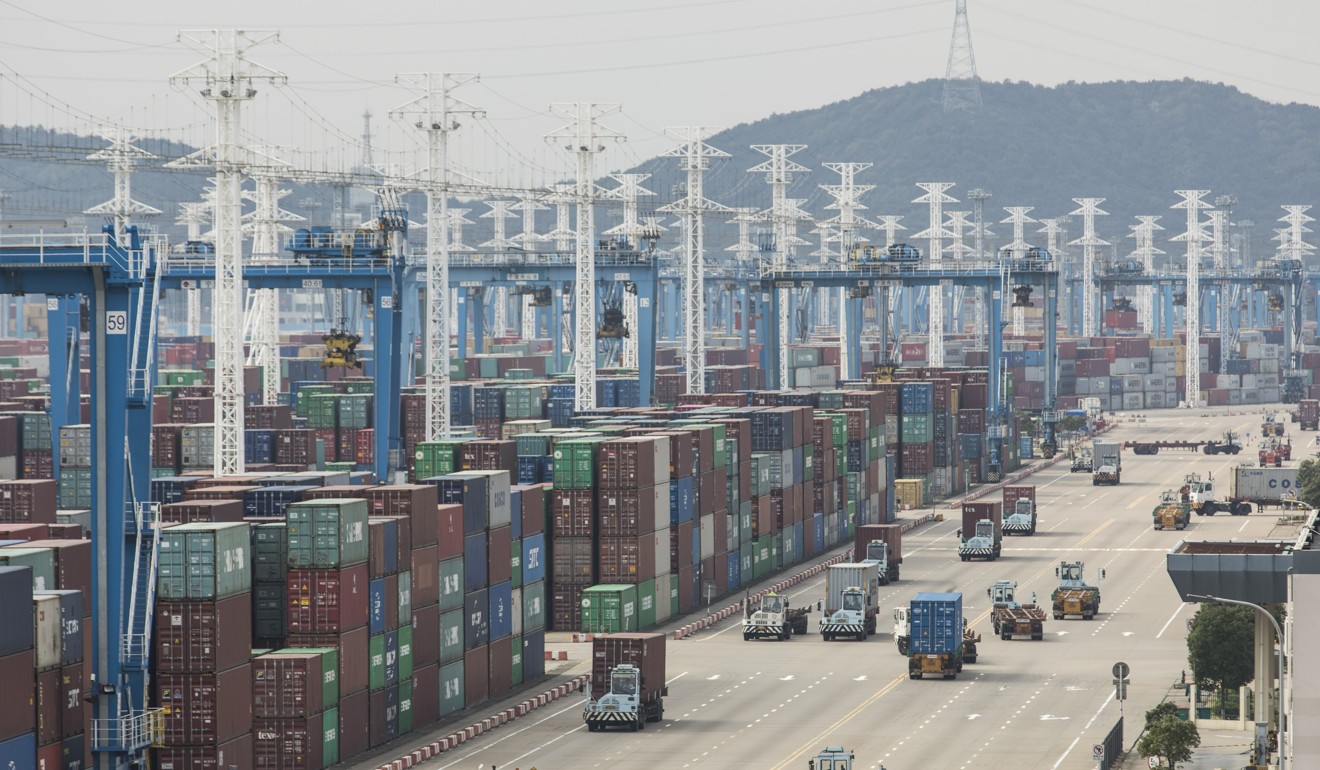
China, Hong Kong stocks fall at start of packed week that includes US elections, Fed meeting
- Traders face busy week of market-moving news, including US elections and Federal Reserve meeting.

Hong Kong and mainland China markets fell on Monday as optimism over US-China relations retreated in a busy week for investors that started with President Xi Jinping vowing to boost imports, and will move on to high-stakes US midterm elections and a meeting of the US Federal Reserve.
The ongoing trade war between the world’s two largest economies continued to weigh on sentiments after White House economic adviser Larry Kudlow denied that the US has drawn up proposed plans with China in an interview with CNBC, lowering expectations of a quick deal.
Hong Kong’s Hang Seng Index lost almost 2.1 per cent, or 551.96 points, to 25,934.39, while the Hang Seng China Enterprises Index was down 1.3 per cent, or 142.85 points, to 10,544.92.
On the mainland, the Shanghai Composite Index slipped 0.41 per cent, or 11.04 points, to 2,665.43, reversing four days of gains. The CSI 300 Index of large caps fell 0.8 per cent, or 27.41 points, to 3,262.84, while the ChiNext gauge of small caps fluctuated throughout the day before edging up a mere 0.04 per cent, or 0.6 points, to 1,348.88.
Optimism disappeared after Hong Kong’s benchmark last week saw its biggest weekly gain in over three years and markets jumped worldwide on news US President Donald Trump and Xi had agreed to a “meeting plus dinner” appointment this month, raising hopes that a deal to end the US-China trade war may be in sight.
“The conversation between the two countries is a positive sign for the market,” said Gordon Tsui, managing director of Hantec Pacific.
Monday’s market drop, he said, was short-term and reflected uncertainty around US-China relations, but would extend “if the market does not see any solid information followed up, or no further measures in trade war negotiations”.
Shanghai’s week-long China International Import Expo began on Monday to promote the country as a major importer of global goods. It attracted 3,600 companies from 172 countries, according to Xi’s opening address.
His speech played up the country’s economic prospects, describing the event as historic for global trade and for China further opening up by promoting free trade and supporting economic globalisation.
Xi announced a new trading venue in Shanghai to make it easier for hi-tech companies to access funding, and said China would cut import tariffs, making it easier for cargoes to go through customs. He expected the value of imported goods to reach US$30 trillion over the next 15 years, and services to reach US$10 trillion.

Activity in China’s manufacturing and services industries have been hit.
The Caixin China General Services Business Activity Index – a gauge of activity in China’s services industry – dipped to its lowest level in 13 months in October, adding to evidence the country is still facing headwinds from the trade war.
The index, which provides a snapshot of operating conditions in the services sector, dropped to 50.8 in October from 53.1 in September, its lowest level since September 2017 and just above the 50-mark which separates expansion from contraction.
There will be ups and downs this week because of the US elections
In the manufacturing sector, the Caixin China General Manufacturing Purchasing Managers’ Index however, picked up to 50.1 in October, just off a 16-month low of 50 in September, according to results released on Thursday. The Caixin measurement best reflects the performance of smaller, mostly private sector firms. It contrasted with the official PMI, which is a better gauge of larger, mostly state-owned enterprises, and fell from 50.8 in September to 50.2 in October.
The Caixin China Composite Output Index, covering both sectors, slid to a 28-month low of 50.5 in October, down from 52.1 in September, the survey released on Monday showed.
Xi’s speech also comes before the US elections on Tuesday, and the Fed’s meeting later in the week that is not expected to lead to any surprises.
“There will be ups and downs this week because of the US elections,” said Tsui.
Chinese property companies were down as developers are cash-strapped over a two-year long crackdown on shadow financing.
Country Garden ended 5.3 per cent down to HK$9.02, while China Evergrande dropped 6.9 per cent to HK$19.36, Sunac China Holdings retreated 3.3 per cent to HK$23.20, and China Vanke lost 3 per cent to HK$26.00.
Sinopec Corp was the only blue chip with gains, rising 1.1 per cent to HK$6.66, while the energy sector was the only sub-index that ended up.
Among the biggest losers were Apple supplier AAC Technologies, which dropped 7.4 per cent to HK$62.15 and Tencent, which lost 3.7 per cent to HK$292.40.